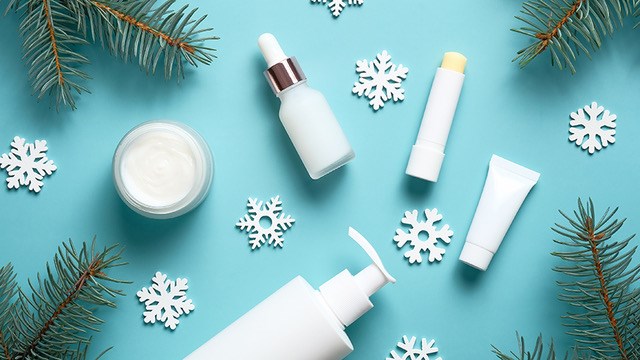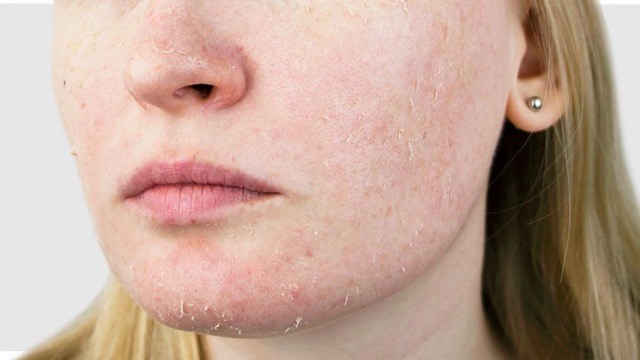Winter’s icy blast is upon us, and the harsh reality is this: winter is terrible for our skin. In winter, humidity levels drop dramatically both indoors and out. The water content of the epidermis (the outermost layer of skin) tends to reflect the level of humidity around it. Dry environment means dry skin. Tight, itchy, flakey, red or irritated skin? Cracked lips? Sensitivity? You may be especially prone to dry winter skin issues.
So what’s a Canadian to do? First some background.
The skin of the epidermis is like shingles on a roof. When the skin is in good repair, like a roof, the surface is smooth and flat. But when the skin is excessively dry it behaves like shingles that are curling, lifting and coming away which allows moisture to escape from below.
Fats in the skin help to keep the epidermal skin cells connected smoothly to each other creating a soft, pliable, and waterproof surface. A waterproof epidermal barrier prevents dehydration of your skin overall.
To solve winter skin issues two essential agents are needed:
- Emollients and
- Humectants
Emollients are oils that deeply penetrate to waterproof the skin while strengthening the bonds between skin cells to smooth the skin surface. Common emollients include oils such as Vitamin E, nut butters and fatty acids.
Among the best emollients are ceramides, a class of fatty acids naturally found in skin cells. Ceramides make up 50 percent of the outer layer of the epidermis. Ceramides function like the mortar between bricks (where you skin cells are the bricks). Your natural ceramides can be depleted by exposure to the sun and aging.
Ceramides rebuild and restore the protective barrier function of skin. Using a ceramide containing moisturizer twice daily will result in plumper, smoother, firmer-feeling skin with fewer visible lines and wrinkles. Your skin will be less sensitive and better resist cold, dry air and wind. Ceramides are most effective in vacuumed packaging, like containers with pump dispensers, which prevents air from entering and keeps the formula stable.
Even individuals with oily skin will benefit from the protection offered by emollients in the winter months, just seek products that state they are non-comedogenic.
Humectants are agents that help the skin to hold water. A commonly available humectant is hyaluronic acid (HA). HA is a naturally occurring sugar in the human body that can retain up to 1000 times its own weight in water. Another particularly effective humectant is silver mushroom (Tremella fuciformis sporocarp) which has 400 times more hydrating power than HA. Unlike HA, silver mushroom has a small molecule size which allows it to deeply penetrate the skin. In addition to its superstar hydration capacity, silver mushroom also supports skin fat cell health.

Emollients and humectants are most effective when they can easily be absorbed by the skin. Therefore, removing the driest, dead skin cells at the skin surface can improve the penetration of lotions and creams. Enzymatic peels, low level laser procedures, retinols and AHA or BHA acid creams are great options for gently exfoliating the skin surface to prepare it for optimal absorption of topical products.
Finally, protect your skin from the sun. Vitamin C serum in the morning plus a moisturizing mineral-based sunscreen can prevent UV damage while calming the skin further due to the anti-inflammatory effect of zinc and titanium found in many sunblocks.
Some other tips for winter:
- Make sure your sunscreen has UVA protection (UVB is less in winter but not UVA)
- Book a hydrating facial (these often include a peel as well)
- Use gentler cleansers in the winter
- Keep well hydrated (consider green tea sometimes in place of coffee)
- Switch out your usual lotion moisturizer for a cream moisturizer
- Protect your lips regularly with an ointment especially before eating and drinking; if you are an outdoors person in the winter consider a zinc oxide lip product
- don’t forget to moisturize your hands regularly after washing; consider oatmeal containing creams to soothe and calm the skin (ideally with UV protection as well)
- Consider a paraffin wax treatment (offered by some mani/pedi places) for hands or feet
- Moisturize in the bath – add bath oil or colloidal oatmeal to soften and hydrate
- Shower tips – avoid using soap on arms, legs and trunk – rinse only; apply a body oil after showering while skin is still wet and rub in before towelling off
Winter’s here! With a little planning and careful choice of products and services your skin can feel like it’s living in the tropics.
For specific product recommendations, please visit Dr. Peirson’s blog post here.
